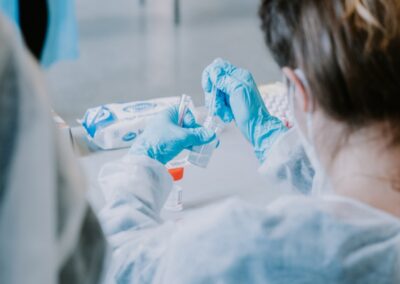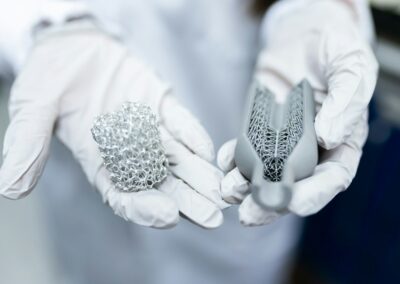Unlocking the Potential of CRISPR in Disease Resistance
Revolutionizing Healthcare with CRISPR Technology
CRISPR technology and human resilience to diseases and environmental stressors have become a focal point in modern biotechnology. This revolutionary gene-editing technology offers unparalleled precision in modifying genetic material, enabling scientists to enhance human resilience to various diseases. For regions like Saudi Arabia, the UAE, Riyadh, and Dubai, which are investing heavily in healthcare and technological innovation, the potential applications of CRISPR technology are particularly significant.
CRISPR, or Clustered Regularly Interspaced Short Palindromic Repeats, allows for targeted modifications to DNA, enabling the correction of genetic mutations that cause diseases. This has profound implications for treating genetic disorders such as cystic fibrosis, muscular dystrophy, and sickle cell anemia. By editing the specific genes responsible for these conditions, CRISPR can potentially provide permanent cures, transforming lives and reducing the burden on healthcare systems.
Moreover, CRISPR technology can enhance resistance to infectious diseases. For instance, researchers are exploring the use of CRISPR to engineer immune cells that are more effective at combating viral infections such as HIV and influenza. This approach could lead to the development of new treatments and vaccines, improving public health and resilience to pandemics.
Applying CRISPR for Cancer Treatment
Another promising application of CRISPR technology is in the field of oncology. Cancer, a leading cause of death worldwide, is often driven by genetic mutations that enable uncontrolled cell growth. CRISPR offers the ability to specifically target and modify these cancer-causing genes, potentially halting the progression of the disease.
In Saudi Arabia and the UAE, where there is a strong emphasis on advancing medical research, CRISPR technology could play a crucial role in developing innovative cancer therapies. Researchers are already experimenting with using CRISPR to enhance the effectiveness of CAR-T cell therapy, a treatment that involves modifying a patient’s immune cells to better recognize and attack cancer cells. By fine-tuning these cells with CRISPR, scientists hope to improve treatment outcomes and reduce side effects.
Additionally, CRISPR can be used to identify genetic markers that predict an individual’s susceptibility to cancer. This information can guide personalized prevention strategies and early detection efforts, ultimately saving lives and reducing healthcare costs.
Improving Human Resilience to Environmental Stressors
Beyond disease resistance, CRISPR technology holds potential for enhancing human resilience to environmental stressors. Climate change, pollution, and other environmental factors pose significant threats to public health. By leveraging CRISPR, scientists can develop solutions to mitigate these risks and improve human adaptation to changing environments.
For example, CRISPR can be used to engineer crops that are more resilient to extreme weather conditions, ensuring food security in regions affected by climate change. Similarly, researchers are exploring the use of CRISPR to enhance the stress tolerance of marine organisms, which could help preserve biodiversity and sustain fisheries.
In human health, CRISPR can potentially be used to develop therapies that protect against the harmful effects of pollution. For instance, gene-editing techniques could be employed to boost the body’s natural detoxification processes, reducing the impact of environmental toxins on health. This is particularly relevant for rapidly developing cities like Riyadh and Dubai, where air quality can be a significant concern.
The Future of CRISPR Technology and Human Resilience
Ethical Considerations and Regulatory Frameworks
As with any powerful technology, the application of CRISPR in improving human resilience raises important ethical considerations. Gene editing, particularly in humans, must be approached with caution to avoid unintended consequences and ensure that modifications are safe and effective. This requires robust regulatory frameworks and international cooperation to establish guidelines and oversight.
In Saudi Arabia and the UAE, where there is a strong commitment to ethical research and innovation, establishing clear regulations for the use of CRISPR technology will be crucial. These frameworks should address issues such as consent, data privacy, and the potential for misuse, ensuring that the benefits of CRISPR are realized while minimizing risks.
Collaboration and Innovation in the Middle East
The successful application of CRISPR technology will depend on collaboration between researchers, healthcare providers, and policymakers. In the Middle East, initiatives that foster cooperation between countries and institutions can accelerate the development and deployment of CRISPR-based solutions. By sharing knowledge and resources, the region can become a leader in biotechnology and contribute to global advancements in healthcare and environmental resilience.
For instance, collaborative research centers in Riyadh and Dubai could focus on developing CRISPR applications tailored to the specific health and environmental challenges faced by the region. These centers could also serve as hubs for training and educating the next generation of scientists and healthcare professionals, ensuring a steady pipeline of talent to drive innovation.
The Role of Business Leaders and Entrepreneurs
Business leaders and entrepreneurs have a critical role to play in the advancement of CRISPR technology. By investing in biotech startups and fostering a culture of innovation, they can help bring new CRISPR-based products and therapies to market. This includes not only medical applications but also solutions for agriculture, environmental management, and other sectors.
In regions like Saudi Arabia and the UAE, where there is a strong emphasis on economic diversification and technological advancement, supporting the biotech industry can create new opportunities for growth and development. This includes funding research, providing infrastructure, and promoting public-private partnerships to accelerate innovation.
Furthermore, business leaders must advocate for responsible and ethical use of CRISPR technology. This involves engaging with policymakers, researchers, and the public to ensure that the benefits of gene editing are realized in a way that is safe, equitable, and socially responsible.
Conclusion: Embracing the Potential of CRISPR Technology
In conclusion, CRISPR technology offers transformative potential for enhancing human resilience to diseases and environmental stressors. By revolutionizing healthcare, improving resistance to infections, and enabling adaptation to changing environments, CRISPR can significantly improve quality of life and public health outcomes.
For regions like Saudi Arabia, the UAE, Riyadh, and Dubai, investing in CRISPR research and innovation can position them as leaders in biotechnology, driving economic growth and improving global health. As we navigate the ethical and regulatory challenges, collaboration and responsible use of CRISPR technology will be key to unlocking its full potential and building a healthier, more resilient future.
—
#CRISPRtechnology #humanresilience #diseaseresistance #environmentalstressors #SaudiArabia #UAE #Riyadh #Dubai #artificialintelligence #blockchain #metaverse #executivecoaching #generativeAI #moderntechnology #businesssuccess #leadershipskills #projectmanagement























